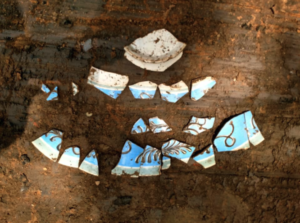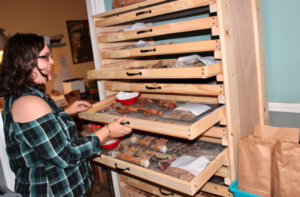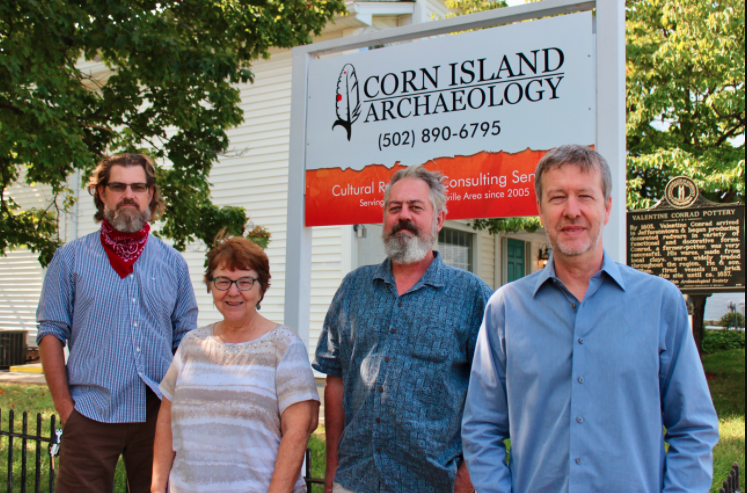Digging Deep
Corn Island Archaeology Provides Private and Public Consulting
Writer / Carrie Vittitoe
Photography Provided
 If you are a child of the 1980s or had children during the 1980s, when you think of archaeology you may picture Harrison Ford as his film persona Indiana Jones, running to escape a large boulder that is barreling towards him with the goal of crushing him to dust. Archaeology is all about bravado and derring-do, right?
If you are a child of the 1980s or had children during the 1980s, when you think of archaeology you may picture Harrison Ford as his film persona Indiana Jones, running to escape a large boulder that is barreling towards him with the goal of crushing him to dust. Archaeology is all about bravado and derring-do, right?
Anne Bader, principal at Corn Island Archaeology LLC, which is located in the heart of Jeffersontown, says there is a lot of exciting stuff that happens in archaeology, but there is also a lot of artifact washing, cataloging and report writing. These sometimes tedious, no-special-effects aspects are the ones George Lucas and Steven Spielberg conveniently left out of their movies.
Where It All Began
When Bader was in the sixth grade and avoiding an early bedtime, she overheard her parents discussing a newspaper article about the discovery of an ancient Sumerian city.
It really captured my attention, she says. The next morning, I got up and cut out that article. I saved it and still have it. From then on, thats what I was gonna do one day.
She continued reading and cutting articles from the newspaper, and even subscribed to Archaeology magazine as a kid.
In high school, Bader was gently discouraged from pursuing archaeology as a career, not only because she was a girl, but also because it didnt seem lucrative. In her senior year, Bader was able to take the first anthropology class ever offered at Assumption High School. She went on to pursue anthropology at the University of Louisville for her bachelors degree, then took a break to marry and raise her four children. She eventually earned her masters degree from the University of Kentucky and after working for others, including the U.S. Army Corps of Engineers for a time, she became an entrepreneur with Corn Island Archaeology.
No Place Like Home
Louisville may not seem nearly as exciting as Egypt, China or Greece when it comes to archaeology, but Bader says the city has just as much to offer in terms of ancient civilizations.
We have things that may not be quite as dramatic-looking as the pyramids and the [Roman] Colosseum, but we have things that are just as old, she says. We have things that go back 12,000 years in this area.
As required by law, Bader and her team at Corn Island Archaeology are frequently called in on jobs by developers or government agencies when federal money is involved in whatever project is being done. Construction of any kind that involves a permit (such as those involving the U.S. Army Corps of Engineers) or is on federal land also requires an archaeological assessment.
 Over the years, Corn Island Archaeology has been involved in some interesting local digs. In 2013, the Corn Island staff conducted archaeological excavation at Locust Grove historic site, which provided information on how the land was used when humans were nomadic and how that land use changed when farming began. Since 2017, Bader and her staff have been working a dig site at the 39-acre Beecher Terrace in downtown Louisville. The citys oldest cemetery was discovered at Beecher Terrace and dates to the 1700s.
Over the years, Corn Island Archaeology has been involved in some interesting local digs. In 2013, the Corn Island staff conducted archaeological excavation at Locust Grove historic site, which provided information on how the land was used when humans were nomadic and how that land use changed when farming began. Since 2017, Bader and her staff have been working a dig site at the 39-acre Beecher Terrace in downtown Louisville. The citys oldest cemetery was discovered at Beecher Terrace and dates to the 1700s.
Bader says downtown Louisville remains a treasure of archaeological sites, even though most people wouldnt think this would be the case because people have been living there for hundreds of years.
Were still finding new sites related to the Native American occupation from thousands of years ago that you would never have thought were still there, Bader says.
I really wanted to do local work, she adds, noting that this is due to her love of Jeffersontown, Louisville and the Falls of the Ohio. I could serve our local community better, cheaper and more effectively by starting my own business.
Even though her dreams as a kid were to study Easter Island, being married with four children meant she needed to stay close to home.
My focus was going to be on the Ohio Valley, she says.
The Traits of an Archaeologist
Having an open mind is an important factor in being an archaeologist, and an openness to the unexpected is critical. Another important part of the job is digging and getting a feel for what youre looking for in the ground.
You need that experience, Bader says. You would be surprised by how many people come out with a masters degree, get into the field for the first time, and they are lost. They need to take field school and gather experience as they go.
Being a successful archaeologist also means recognizing that while digging can be fascinating, archaeology also involves a lot of report-writing. Bader says her staff of 24 spends a lot of time in the office washing, cataloging and photographing artifacts, as well as adding information to computer databases and writing reports. Depending on the number and types of artifacts discovered at a dig, these reports can be hundreds of pages in length.
Education is another aspect of what successful archaeologists do. Bader says she and members of her staff often give lectures to neighborhoods or historic societies, and also make posters or artifact displays. It can be a challenge to protect sensitive information on dig sites (for fear of looting) while also keeping the knowledge gained from the digs available to the public. Reports are stored at the Office of State Archaeology, where they generally dont see the light of day.
There is a great deal of history that we learn, Bader says. We try to give reports to public libraries. This is being paid for by public money, so it needs to benefit the public.
Bader credits her staff with making Corn Island Archaeology successful.
I couldnt do a thing without them, she says. I appreciate the people that Ive got here.
The Heart of Jeffersontown
As a lover of past cultures, Bader specifically picked her office site at 10320 Watterson Trail in Louisville because it was the location of a former pottery kiln owned by Valentine Conrad. The name of her firm, Corn Island, also has important historical relevance to the city of Louisville. Corn Island was originally surveyed in 1773, and was used by General George Rogers Clark and his men in 1778 prior to capturing a fort in Illinois.
Advice to Young Archaeologists
While Bader jokes that an archaeologist may get filthy but they wont get rich, she does have words of wisdom for young people who are interested in joining the profession. Acquiring a postgraduate degree is necessary for being able to sign off on reports and establish oneself as a principal in ones own firm. Getting into excavation sites of all kinds early and often is another plus, as well as having lots of experience at various levels, from big firms to small firms to teaching courses at community or state colleges. Finally, she encourages young black and Native American students to consider archaeology as a field of study.
It is apparent to us that we need their voices to be in archaeology to tell the stories of their people, she says.
While Bader hasnt fallen into a pit of snakes like Indiana Jones, she has had some remarkable experiences throughout her career including establishing the Falls of the Ohio Archaeological Society, which brings together professional archaeologists and individuals who always wanted to be archaeologists. She admits that she has dragged her husband to nearly every archaeological site in the southeastern part of the country.
Sometimes it is an adventure, she says. Theres that romance of faraway places and distant times, and sometimes we get it. Sometimes we dig 1,800 holes and theyre all empty – boring, boring, boring. Almost 50 years into this, and I still get excited when we find something cool.
For more info on Corn Island Archaeology, go to ciarchaeology.com.





